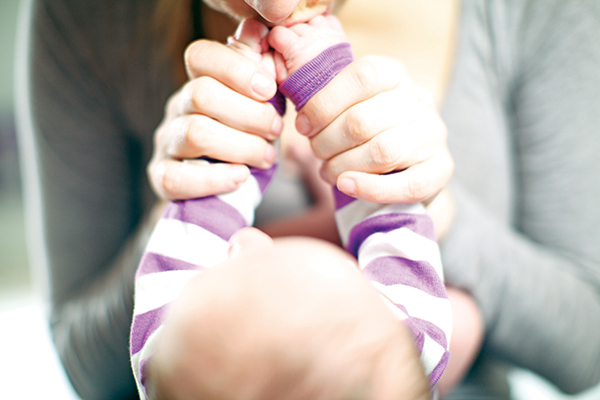Grant brings hope to mothers battling depression

It's 2 p.m. and Amanda is just waking up. She's been sleeping a lot lately – sometimes 12 or more hours a day – and she can't seem to find the energy to care for her young children.
She knows she needs help, but it isn't until a home visitor from Akron Metropolitan Housing Authority's Early Childhood Initiative comes to her door that Amanda realizes she's been struggling with maternal depression.
"Maternal depression is very common for moms in poverty," said Katie Collard, AMHA community partnerships coordinator. "When you're not sure where your next meal is coming from or if you'll be able to keep your utilities on, it becomes a really vulnerable time."
In fact, more than 40% of mothers screened in AMHA housing communities show signs of depression, she said. That's the primary reason AMHA teamed up with Child Guidance & Family Solutions to create a program for women struggling to balance new motherhood with the demands of everyday life.
The program, which received a $10,000 grant from the Women's Endowment Fund, includes home screenings for depression and monthly support groups where women can build healthy relationships with other moms.
The Mom-ME Time support groups draw a wide variety of women, from grandmothers caring for young children to teen moms. Some of the mothers are continuing a cycle of multi-generational poverty while others ended up in AMHA housing after suffering a serious illness or losing a job. All of them are grateful for the chance to find light at the end of the tunnel.
"I never even knew how happy I could be until I started going to Mom-ME Time," said one mother.
Topics range from self-care and time management to budgeting and parenting. Moms are encouraged to start a journal to organize their thoughts and plan their day. According to Collard, even something as simple as learning to make a grocery list can go a long way in helping mothers with depression make breakfast and get their kids to school.
"It has been really eye-opening to these moms to realize that when they can take care of themselves, they are able to parent better," she said.
That's exactly what the Women's Endowment Fund aims to do by funding programs that support the mental and physical health of women and girls. By focusing on the well-being of mothers, the whole family – and community – benefits.
"When moms don't have the energy or strength or desire to bond with their babies, they're not making that initial attachment, which is so crucial to a child's mental, physical and emotional development," Collard said. "We need to address the depression so there's not a trickle-down effect on these children."
